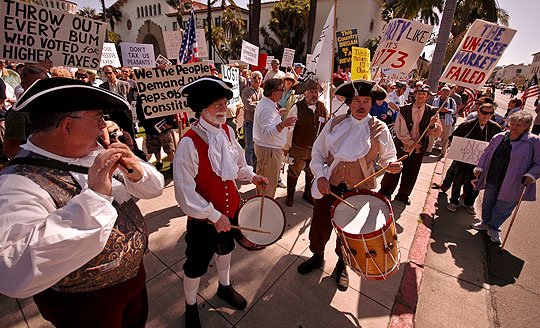The Tea Party considers military spending cuts

Most Tea Party-ers have always advocated government spending cuts, except when it comes to the Pentagon's budget. Now that the debt ceiling legislation has passed, activists in the Tea Party movement are calling on lawmakers to reduce military spending, as if they had all received a simultaneous upgrade to their Big Government-detecting radar. Pressure from Tea Party groups has even prompted Republican leaders in Congress to exclude any outstanding defense hawks from nomination to the newly created “Supercommittee.” What gives?
What could explain this sudden retreat by the liberty-lauding mainliners of the Tea Party to their ideological roots in the non-interventionist philosophies voiced by Ron Paul, whose 2008 campaign for president sparked the political organization of this – a third, more independent voice in American politics?
A better question to ask might be how the Tea Party strayed so far from its roots. In my view, it's become increasingly clear that the "mainstream" Tea Party isn't the ideological progeny of Dr. Paul and doesn't share the same truly conservative (what we would call today, Libertarian) values. Mainstreamers labeled themselves Tea Party members early on not because they found themselves to be disenfranchised Independents like many in Paul's base, but because they were tired of being disenfranchised Republicans who were threatened by a looming liberal takeover. Herein lies the fundamental difference: Paul's Tea Party is ideological and inclusive, harkening back to the “big-tent” times of the GOP, while the mainstream Tea Party is reactionary and exclusive, a straw man for neocon and neoliberals alike.
The bottom line is that a big tent philosophy doesn't profit a two-party system. However, the illusion of a third party does. No matter the talk from the Tea Party, or the angling by Republicans, you can bet the Military-Industrial Complex will be well-represented by our new Supercongress. And let's not forget that Democrats have proven themselves to be just as fond of wars as Republicans, especially domestic ones.




